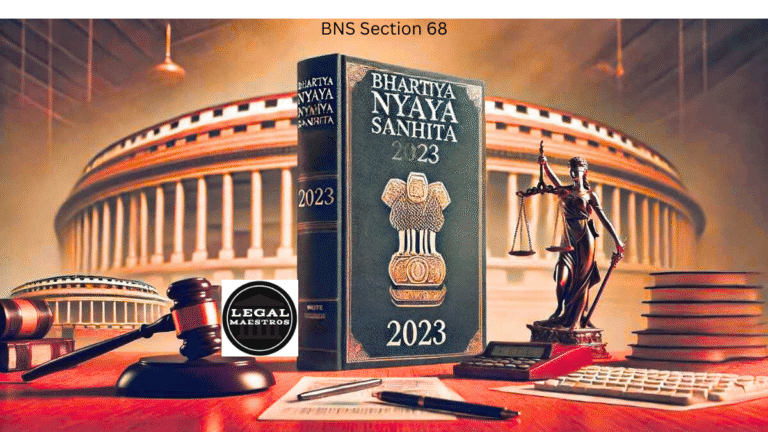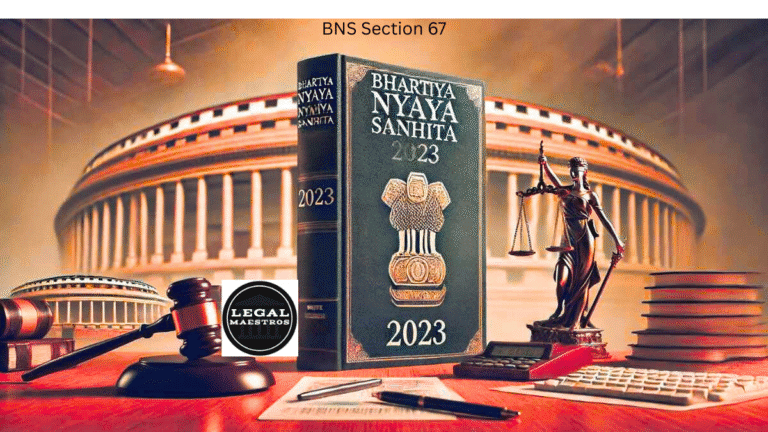
What is Abetment? Section 45 of the Bharatiya Nyaya Sanhita 2023
Introduction
Individuals are subject to punishment under criminal law not just for committing a crime themselves, but also for assisting or persuading another individual to commit the same crime. This type of assistance or encouragement is referred to as “abetment.” It is explained in Section 45 of the Bharatiya Nyaya Sanhita (BNS) 2023 who is deemed to have aided and abetted a crime and under what circumstances they can be held responsible for their actions, even if they did not commit the crime themselves.
To what does the term “abetment” refer?
In accordance with the provisions of Section 45 of the BNS 2023, a person is considered to be helping to carry out an activity if they are involved in any one of the three following ways:
In the first place, if one individual encourages another person to engage in any kind of illegal activity. When someone is provoked, encouraged, or pressured to engage in a criminal conduct, this is referred to as instigating. It is included in this category instances in which someone intentionally conceals vital facts or utilizes misleading information in order to coerce another individual into doing action.
For any queries or to publish an article or post or advertisement on our platform, do call at +91 6377460764 or email us at contact@legalmaestros.com.
A person is also guilty of abetment if they are a member of a “conspiracy” with one or more other individuals to conduct an illegal act, and if they take some step in support of that plan, whether it be an action or an illegal omission (failing to act when legally compelled), they are considered to be complicit in the commission of the criminal act.
Third, if someone “intentionally helps” another person in doing something illegal, whether through an action or by not doing something about which they were obligated to, then that person is likewise guilty of abetment. There is the potential for the helper to be punished under this clause even if the primary act is carried out by another individual.
For More Updates & Regular Notes Join Our Whats App Group (https://chat.whatsapp.com/DkucckgAEJbCtXwXr2yIt0) and Telegram Group ( https://t.me/legalmaestroeducators )
For any queries or to publish an article or post or advertisement on our platform, do call at +91 6377460764 or email us at contact@legalmaestros.com.
Abetment by Instigation via Misrepresentation is the first explanation being offered.
It is possible for a person to be criminally responsible for inciting another person to commit a criminal conduct by lying or concealing a truth that they were required to convey. One example of this is intentionally giving someone the impression that they are taking a step that they otherwise would not have made. As an illustration, if a person gives false information to a law enforcement official in order to persuade them to arrest the incorrect person, then that person has aided and abetted the unjust arrest.
It is an illustration.
Assume that A is a law enforcement officer who is tasked with the responsibility of apprehending a person named Z. Although B is aware of this, he is also aware that C is not Z. Despite this, B reveals to A that C is Z. A makes an arrest of C on the basis of this bogus information. B has been complicit in the unlawful arrest of C by encouraging A through the use of a falsehood in this particular instance.
For any queries or to publish an article or post or advertisement on our platform, do call at +91 6377460764 or email us at contact@legalmaestros.com.
This is the second explanation: “Abetting by Aiding.”
A person is considered to be aiding a crime if they assist in the conduct of the crime, whether it be before the crime is committed or while it is being committed. The provision of tools, the provision of shelter, the maintaining of watch, or any other action that makes it simpler for the primary offender to conduct the offense are all examples of this type of assistance.
As an illustration, if X intends to rob a house and Y provides him with a duplicate key or assists him in escaping after the robbery, then Y is guilty of supporting the crime and, hence, encouraging it to occur.
Importance in the Legal System
Abetment regulations are essential due to the fact that criminal acts are frequently the consequence of criminal collaboration. Even if a person did not conduct the crime directly, they are still seen to be equally culpable in the eyes of the law if they actively encouraged, planned, or assisted in the commission of the crime. All individuals who are involved in a crime, even if they are only indirectly implicated, are able to be held legally liable thanks to this provision.
For any queries or to publish an article or post or advertisement on our platform, do call at +91 6377460764 or email us at contact@legalmaestros.com.
Relationship to Previously Enacted Law
The provision in question is comparable to Section 107 of the previous version of the Indian Penal. By using language and structure that are more understandable, the Bharatiya Nyaya Sanhita has contributed to the continuation of the same concepts.
It is made abundantly apparent in Section 45 of the Bharatiya Nyaya Sanhita 2023 that the perpetrator of a crime is not the only factor that determines the nature of the offense. Any individual who supports, plans with others, or assists in the commission of the offense is subject to the same level of punishment. This ensures that justice is not restricted to penalizing only the one who takes direct responsibility for the crime, but also those who were involved in the process of making the crime happen behind the scenes.





![Research Assistantship @ Sahibnoor Singh Sindhu, [Remote; Stipend of Rs. 7.5k; Dec 2025 & Jan 2026]: Apply by Nov 14, 2025!](https://legalmaestros.com/wp-content/uploads/2025/11/Gemini_Generated_Image_s0k4u6s0k4u6s0k4-768x707.png)
![Karanjawala & Co Hiring Freshers for Legal Counsel [Immediate Joining; Full Time Position in Delhi]: Apply Now!](https://legalmaestros.com/wp-content/uploads/2025/11/Gemini_Generated_Image_52f8mg52f8mg52f8-768x711.png)
![Part-Time Legal Associate / Legal Intern @ Juris at Work [Remote]: Apply Now!](https://legalmaestros.com/wp-content/uploads/2025/11/ChatGPT-Image-Nov-12-2025-08_08_41-PM-768x768.png)
![JOB POST: Legal Content Manager at Lawctopus [3-7 Years PQE; Salary Upto Rs. 70k; Remote]: Rolling Applications!](https://legalmaestros.com/wp-content/uploads/2025/11/ChatGPT-Image-Nov-12-2025-08_01_56-PM-768x768.png)
1 thought on “What is Abetment? Section 45 of the Bharatiya Nyaya Sanhita 2023”